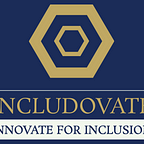To All African Mothers: You Can Do Both, Motherhood and Following Your Dreams!
By Kelemua Zenebe
It is not easy to be a woman with a disability here in Africa, simply because some opportunities might not be accessible to you! As a blind working mother in Ethiopia, let me tell you:
“You can do both; Motherhood and successfully following your dreams.”
My name is Kelemua, and I am a disability inclusion researcher at Includovate. Being a working Ethiopian mother with a disability is not an easy path. For example, some women would like to have children, but doubt it because there are no structures in place to make the lives of working mothers with a disability easier. And for those women who decide to get married, but choose to not have children, they face social condemnation that makes life difficult. For me: having children in Ethiopia is a mix of gain and pain, and a difficult decision to make.
Photo caption: Kelemua Zenebe with her 2 boys (and she works part-time while completing her PhD).
It is a difficult decision, that is for sure! I myself decided that I would have children and, of course, this has changed my life and affected my future options. Nevertheless, if you are a natural fighter like I am, there are possibilities: I started attending my PhD when my second son was only 6 months and 3 days old. You could see me day in day out with my son on my back and with headsets in my ears, listening to my lectures. On the days when one of my children would get sick, I would somehow manage to take care of them and my education, at the same time. Let’s say that I lost 18 kg weight within the first three months of my education. So, yes. It is possible. However, it won’t come easy!
Today my two boys are 9 and 4 years old and I’m halfway through my PhD, and every day I am still so glad I started my studies.
My next challenge, however, was to find an employer that would be willing to hire someone with a disability to work from home during COVID-19 times. How often I have heard at other interviews that ‘this job will not be comfortable for you.’ Of course, there will always be some tasks I am unable to perform as a person who is visually impaired and living in Ethiopia where there are frequent power failures and an unreliable state own internet provider. But then I started working part-time at Includovate, and they are different: they even hired an assistant to help me out with my work and my PhD. This is where I learned that in the end, working for a real inclusive organisation, such as Includovate, is the only thing that counts. I feel welcome, comfortable and appreciated for what I am able to contribute, despite, or maybe even because of, my disabilities.
I chose to have children and I chose to get my PhD. African women need to stand up, not wait for someone else to raise your issues or consider your realities. There are organisations like Includovate out there who can make it easier, but we need to step up and empower ourselves. We have to realise that we, as African mothers with disabilities, need to be determined to fight, and gain what we deserve, just as any other woman on the European or American continent.
Additionally, we need academics to stand up for us too. We need them to show African mothers the window of opportunity. Just by showing them the window, they will penetrate every room of the house. Do not give them money or something else materialistic, rather show them what they are capable of. Support them to achieve their dreams, however far-fetched they may seem to you. With this, you will see what we, African mothers, are able to do with the (figuratively speaking) hammer in our hands!
Once I get my PhD, my next challenge is politics. We must make sure we have African women (and those with a disability) in high leadership positions to influence policies and other legal instruments that influence our daily lives, both now and those of our children in the future.
About the author:
Kelemua Zenebe has more than 10 years of experience in research and academia. She has a Masters of Arts in Gender Studies from Addis Ababa University. She is currently completing her PhD on Social Work. Her communication, teamwork skills, and leadership qualities are impeccable. Kelemua is visually impaired and aims to make changes through evidence of the lives of women living with disabilities.
Includovate is a feminist research incubator that “walks the talk”. Includovate is an Australian social enterprise consisting of a consulting firm and research incubator that designs solutions for gender equality and social inclusion. Its mission is to incubate transformative and inclusive solutions for measuring, studying, and changing discriminatory norms that lead to poverty, inequality, and injustice. To know more about us at Includovate, follow our social media: @includovate, LinkedIn, Facebook, Instagram.
